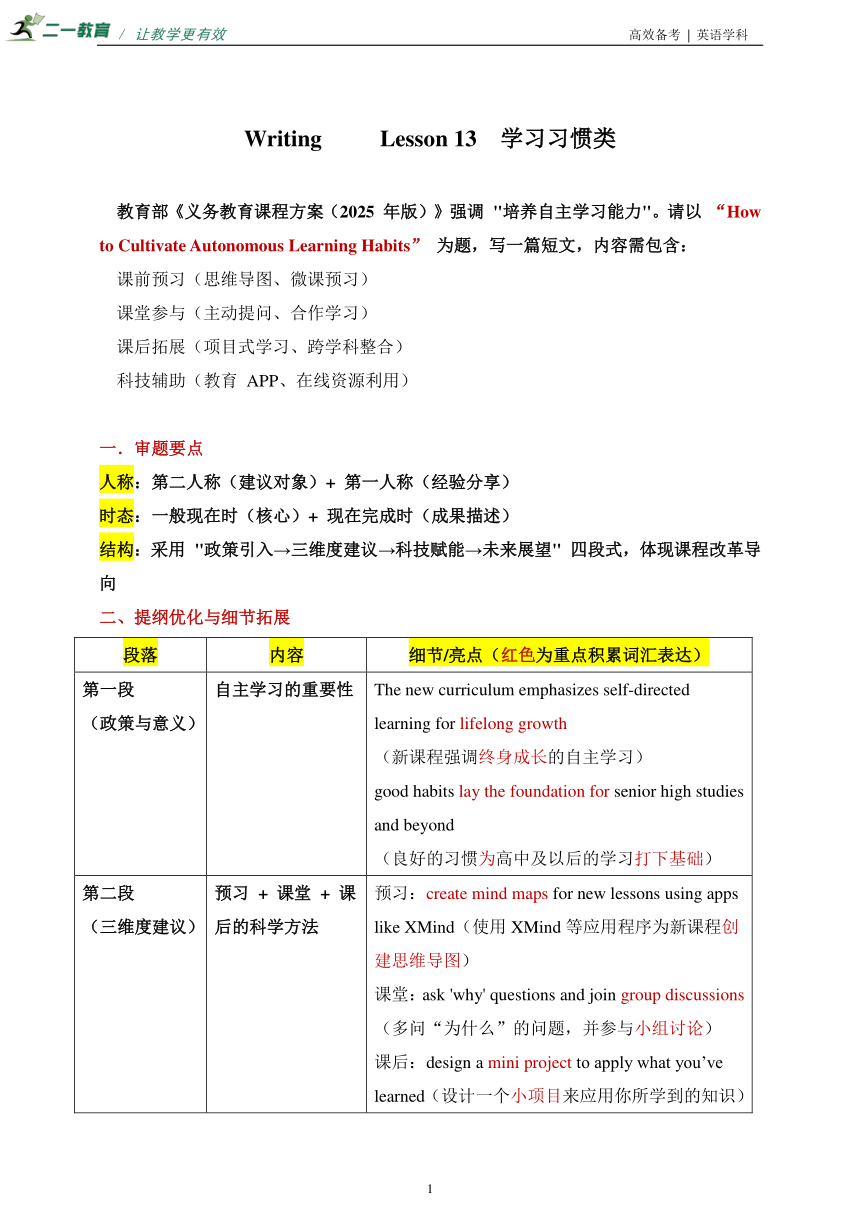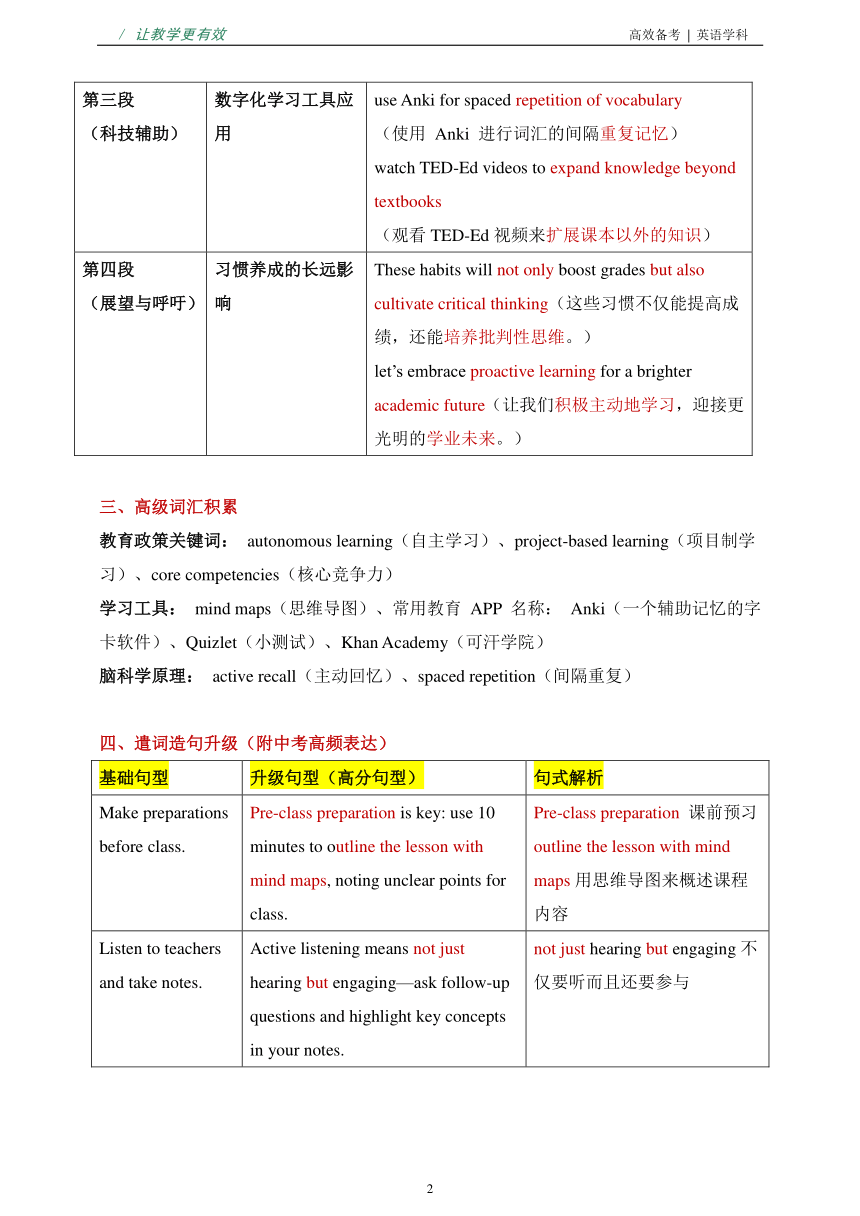2025届考生必备中考英语热点话题写作指导学案 Lesson 13 学习习惯类
文档属性
| 名称 | 2025届考生必备中考英语热点话题写作指导学案 Lesson 13 学习习惯类 |

|
|
| 格式 | docx | ||
| 文件大小 | 45.2KB | ||
| 资源类型 | 试卷 | ||
| 版本资源 | 通用版 | ||
| 科目 | 英语 | ||
| 更新时间 | 2025-05-23 12:40:47 | ||
图片预览


文档简介
/ 让教学更有效 高效备考 | 英语学科
Writing Lesson 13 学习习惯类
教育部《义务教育课程方案(2025 年版)》强调 "培养自主学习能力"。请以 “How to Cultivate Autonomous Learning Habits” 为题,写一篇短文,内容需包含:
课前预习(思维导图、微课预习)
课堂参与(主动提问、合作学习)
课后拓展(项目式学习、跨学科整合)
科技辅助(教育 APP、在线资源利用)
一.审题要点
人称:第二人称(建议对象)+ 第一人称(经验分享)
时态:一般现在时(核心)+ 现在完成时(成果描述)
结构:采用 "政策引入→三维度建议→科技赋能→未来展望" 四段式,体现课程改革导向
二、提纲优化与细节拓展
段落 内容 细节/亮点(红色为重点积累词汇表达)
第一段 (政策与意义) 自主学习的重要性 The new curriculum emphasizes self-directed learning for lifelong growth (新课程强调终身成长的自主学习) good habits lay the foundation for senior high studies and beyond (良好的习惯为高中及以后的学习打下基础)
第二段 (三维度建议) 预习 + 课堂 + 课后的科学方法 预习:create mind maps for new lessons using apps like XMind(使用XMind等应用程序为新课程创建思维导图) 课堂:ask 'why' questions and join group discussions(多问“为什么”的问题,并参与小组讨论) 课后:design a mini project to apply what you’ve learned(设计一个小项目来应用你所学到的知识)
第三段 (科技辅助) 数字化学习工具应用 use Anki for spaced repetition of vocabulary (使用 Anki 进行词汇的间隔重复记忆) watch TED-Ed videos to expand knowledge beyond textbooks (观看TED-Ed视频来扩展课本以外的知识)
第四段 (展望与呼吁) 习惯养成的长远影响 These habits will not only boost grades but also cultivate critical thinking(这些习惯不仅能提高成绩,还能培养批判性思维。) let’s embrace proactive learning for a brighter academic future(让我们积极主动地学习,迎接更光明的学业未来。)
高级词汇积累
教育政策关键词: autonomous learning(自主学习)、project-based learning(项目制学习)、core competencies(核心竞争力)
学习工具: mind maps(思维导图)、常用教育 APP 名称: Anki(一个辅助记忆的字卡软件)、Quizlet(小测试)、Khan Academy(可汗学院)
脑科学原理: active recall(主动回忆)、spaced repetition(间隔重复)
四、遣词造句升级(附中考高频表达)
基础句型 升级句型(高分句型) 句式解析
Make preparations before class. Pre-class preparation is key: use 10 minutes to outline the lesson with mind maps, noting unclear points for class. Pre-class preparation 课前预习 outline the lesson with mind maps用思维导图来概述课程内容
Listen to teachers and take notes. Active listening means not just hearing but engaging—ask follow-up questions and highlight key concepts in your notes. not just hearing but engaging不仅要听而且还要参与
Do more reading after class. Post-class extension could involve reading relevant articles on National Geographic Kids or writing a short reflection blog. Post-class extension 课后拓展 writing a short reflection blog写一篇简短的反思博客
五、句型总结(新增中考高频句型)
1.政策引用:
As stated in the 2025 Curriculum Plan, autonomous learning is a core competency for modern students.(被动语态 + 政策引用)
(正如《2025年课程计划》所述,自主学习是现代学生的核心能力。)
2.方法推荐:
A proven strategy is to combine pre-class preview with in-class discussion for deeper understanding.(不定式作表语 + 复合宾语)
(一个行之有效的策略是将课前预习与课堂讨论结合起来,以加深理解。)
3.科技赋能:
Educational apps like Quizlet can turn vocabulary learning into an interactive experience.(介词短语作定语)
(像Quizlet这样的教育应用程序可以把词汇学习变成一种互动体验。)
4.长远影响:
Cultivating these habits now will benefit you throughout your academic journey and future career.(动词 - ing 作主语)
(现在培养这些习惯将使你在整个学习过程和未来的职业生涯中受益。)
六、强化版填空训练-根据中文提示补全句子,注意使用升级表达:
1. ___________________ (根据 2025 课程方案), developing autonomous learning habits is ___________________ (核心素养之一).
2. Before class, ___________________ (用思维导图梳理知识点) to identify ___________________ (重点和难点).
3. In class, don’t hesitate to ___________________ (提出探究性问题) and ___________________ (参与小组项目).
4. After school, ___________________ (用 Anki 卡片复习) and ___________________ (观看学科相关纪录片) to reinforce learning.
5. ___________________ (这些习惯不仅提升成绩), but also ___________________ (培养终身学习能力).
答案示例:
As outlined in the 2025 Curriculum Plan; one of the core competencies
use mind maps to outline key points; main ideas and difficult concepts
ask exploratory questions; participate in group projects
review with Anki flashcards; watch subject-related documentaries
These habits not only improve grades; cultivate lifelong learning skills
七、参考范文(可根据学生水平进行删减参考)
How to Cultivate Autonomous Learning Habits
The 2025 Curriculum Plan highlights the importance of self-directed learning. Here’s how to build effective habits for academic growth:
1. Pre-Class: Lay the Foundation
Spend 15 minutes previewing new lessons with mind maps (try XMind) to outline key concepts. Jot down questions like "What’s the main idea of this chapter " to bring to class. This activates your brain and makes teaching more engaging.
2. In-Class: Engage Actively
Active participation beats passive listening. Raise hands to ask "why" questions and take notes using the Cornell method—leave space for reflections beside key points. Group discussions are great for solving problems together and clarifying doubts.
3. Post-Class: Extend Beyond Textbooks
Finish homework with focus, then explore topics further. Use apps like Khan Academy for extra explanations or design a mini project, such as creating a timeline for history or a science experiment video. Reading English newspapers like 21st Century can also boost language skills.
By integrating these habits, you’ll not only excel in exams but also develop critical thinking and curiosity—skills that will serve you well in high school and beyond. Let’s take charge of our learning journey today!
Writing Lesson 13 学习习惯类
教育部《义务教育课程方案(2025 年版)》强调 "培养自主学习能力"。请以 “How to Cultivate Autonomous Learning Habits” 为题,写一篇短文,内容需包含:
课前预习(思维导图、微课预习)
课堂参与(主动提问、合作学习)
课后拓展(项目式学习、跨学科整合)
科技辅助(教育 APP、在线资源利用)
一.审题要点
人称:第二人称(建议对象)+ 第一人称(经验分享)
时态:一般现在时(核心)+ 现在完成时(成果描述)
结构:采用 "政策引入→三维度建议→科技赋能→未来展望" 四段式,体现课程改革导向
二、提纲优化与细节拓展
段落 内容 细节/亮点(红色为重点积累词汇表达)
第一段 (政策与意义) 自主学习的重要性 The new curriculum emphasizes self-directed learning for lifelong growth (新课程强调终身成长的自主学习) good habits lay the foundation for senior high studies and beyond (良好的习惯为高中及以后的学习打下基础)
第二段 (三维度建议) 预习 + 课堂 + 课后的科学方法 预习:create mind maps for new lessons using apps like XMind(使用XMind等应用程序为新课程创建思维导图) 课堂:ask 'why' questions and join group discussions(多问“为什么”的问题,并参与小组讨论) 课后:design a mini project to apply what you’ve learned(设计一个小项目来应用你所学到的知识)
第三段 (科技辅助) 数字化学习工具应用 use Anki for spaced repetition of vocabulary (使用 Anki 进行词汇的间隔重复记忆) watch TED-Ed videos to expand knowledge beyond textbooks (观看TED-Ed视频来扩展课本以外的知识)
第四段 (展望与呼吁) 习惯养成的长远影响 These habits will not only boost grades but also cultivate critical thinking(这些习惯不仅能提高成绩,还能培养批判性思维。) let’s embrace proactive learning for a brighter academic future(让我们积极主动地学习,迎接更光明的学业未来。)
高级词汇积累
教育政策关键词: autonomous learning(自主学习)、project-based learning(项目制学习)、core competencies(核心竞争力)
学习工具: mind maps(思维导图)、常用教育 APP 名称: Anki(一个辅助记忆的字卡软件)、Quizlet(小测试)、Khan Academy(可汗学院)
脑科学原理: active recall(主动回忆)、spaced repetition(间隔重复)
四、遣词造句升级(附中考高频表达)
基础句型 升级句型(高分句型) 句式解析
Make preparations before class. Pre-class preparation is key: use 10 minutes to outline the lesson with mind maps, noting unclear points for class. Pre-class preparation 课前预习 outline the lesson with mind maps用思维导图来概述课程内容
Listen to teachers and take notes. Active listening means not just hearing but engaging—ask follow-up questions and highlight key concepts in your notes. not just hearing but engaging不仅要听而且还要参与
Do more reading after class. Post-class extension could involve reading relevant articles on National Geographic Kids or writing a short reflection blog. Post-class extension 课后拓展 writing a short reflection blog写一篇简短的反思博客
五、句型总结(新增中考高频句型)
1.政策引用:
As stated in the 2025 Curriculum Plan, autonomous learning is a core competency for modern students.(被动语态 + 政策引用)
(正如《2025年课程计划》所述,自主学习是现代学生的核心能力。)
2.方法推荐:
A proven strategy is to combine pre-class preview with in-class discussion for deeper understanding.(不定式作表语 + 复合宾语)
(一个行之有效的策略是将课前预习与课堂讨论结合起来,以加深理解。)
3.科技赋能:
Educational apps like Quizlet can turn vocabulary learning into an interactive experience.(介词短语作定语)
(像Quizlet这样的教育应用程序可以把词汇学习变成一种互动体验。)
4.长远影响:
Cultivating these habits now will benefit you throughout your academic journey and future career.(动词 - ing 作主语)
(现在培养这些习惯将使你在整个学习过程和未来的职业生涯中受益。)
六、强化版填空训练-根据中文提示补全句子,注意使用升级表达:
1. ___________________ (根据 2025 课程方案), developing autonomous learning habits is ___________________ (核心素养之一).
2. Before class, ___________________ (用思维导图梳理知识点) to identify ___________________ (重点和难点).
3. In class, don’t hesitate to ___________________ (提出探究性问题) and ___________________ (参与小组项目).
4. After school, ___________________ (用 Anki 卡片复习) and ___________________ (观看学科相关纪录片) to reinforce learning.
5. ___________________ (这些习惯不仅提升成绩), but also ___________________ (培养终身学习能力).
答案示例:
As outlined in the 2025 Curriculum Plan; one of the core competencies
use mind maps to outline key points; main ideas and difficult concepts
ask exploratory questions; participate in group projects
review with Anki flashcards; watch subject-related documentaries
These habits not only improve grades; cultivate lifelong learning skills
七、参考范文(可根据学生水平进行删减参考)
How to Cultivate Autonomous Learning Habits
The 2025 Curriculum Plan highlights the importance of self-directed learning. Here’s how to build effective habits for academic growth:
1. Pre-Class: Lay the Foundation
Spend 15 minutes previewing new lessons with mind maps (try XMind) to outline key concepts. Jot down questions like "What’s the main idea of this chapter " to bring to class. This activates your brain and makes teaching more engaging.
2. In-Class: Engage Actively
Active participation beats passive listening. Raise hands to ask "why" questions and take notes using the Cornell method—leave space for reflections beside key points. Group discussions are great for solving problems together and clarifying doubts.
3. Post-Class: Extend Beyond Textbooks
Finish homework with focus, then explore topics further. Use apps like Khan Academy for extra explanations or design a mini project, such as creating a timeline for history or a science experiment video. Reading English newspapers like 21st Century can also boost language skills.
By integrating these habits, you’ll not only excel in exams but also develop critical thinking and curiosity—skills that will serve you well in high school and beyond. Let’s take charge of our learning journey today!
